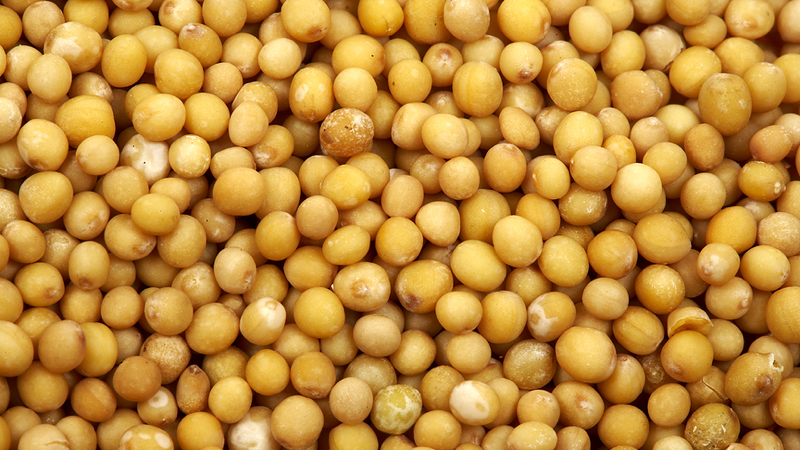Base oil of the month - Mustard Seed

Mustard Seed Carrier Oil (Sinapsis alba) is pressed from the seeds of the mustard plant. The oil is rich in antioxidants, Vitamins E, D, A and K plus Omega 3 and 6 essential fatty acids. It also contains the minerals zinc and selenium.
History of mustard
Mustard seeds have been used since ancient times for culinary, medicinal, religious and cultural purposes. The earliest known documentation of mustard’s use dates back to Sumerian and Sanskrit texts from 3000 BC. The Egyptians used mustard seeds to flavour their food and seeds were found in the tomb of Tutankhamun. Ancient Greeks Pythagoras and Hippocrates used mustard in medicines and poultices for a variety of ailments and the Romans used it as both a medicine and food.
The Romans were responsible for introducing mustard to Europe where it was first cultivated and sold by monks in Northern-France. It became a popular spice in Europe prior to the Asian spice trade and was widely appreciated long before pepper. Prepared mustard, as we currently know it, originated in Dijon in the 13th century, and in the 19th century, Britain became the first country to mill mustard seed and use it as an industrial food ingredient.
Mustard and Ayurveda
Mustard plays an integral role in Indian culture and Ayurvedic medicine and its therapeutic properties are well documented in classical Ayurvedic texts.
Mustard is widely used in Indian cuisine as well as in various cultural rituals. In Ayurveda, the seeds and oil are used medicinally either on their own or in various formulations and are particularly recommended for excess Vata and Kapha problems.
When applied topically the oil has a warming effect on the skin. It is commonly used in body massage and Indian Head Massage to improve blood circulation and to relieve pain and inflammation. It is also beneficial for respiratory problems, ridding the body of toxins and caring for the skin and hair.
Therapeutic uses of Mustard Seed Oil
Skincare
The oil’s antimicrobial properties can help protect the skin against infection. It can therefore be useful for minor skin problems such as cuts, abrasions, insect bites and athlete’s foot. Being rich in antioxidant Vitamin E, the oil can help to reduce the signs of ageing and protect against sun damage, and it is also thought to be helpful for eczema and psoriasis when added at 5% to another carrier oil (skin patch test is always recommended first).
Interesting fact: An Ayurvedic tradition known as ‘nabhi chikitsa’ involves rubbing oil into the belly button. The navel is considered the body’s centre, representing the origin of life. It is rich in blood vessels that can transport the oil’s nutrients throughout the body. This is thought to boost the condition of the skin and is a traditional remedy for relieving dry, chapped lips.
Haircare
Mustard Seed Oil is rich in nutrients and essential fatty acids that help improve the condition of the hair and scalp. Massaging the scalp with this oil helps to stimulate blood circulation to the hair follicles which can help to revitalise dull, lifeless locks, promote healthy growth and reduce premature greying and hair loss. The oil’s antibacterial and antifungal properties may also be useful for scalp problems such as dandruff.
Joints and muscles
The oil has a warming / rubefacient effect that is excellent for boosting the circulation and relieving pain and inflammation. It is helpful for sore, stiff muscles and joints including backache and rheumatism, and is particularly nice in winter for warming the body and relaxing the muscles.
Interesting fact: In Winter, many Indians massage warm mustard oil into their feet after a bath or shower.
Respiratory system
Mustard oil is thought to clear congestion (phlegm / mucous) from the respiratory system. It has long been used as a traditional remedy in chest rubs and steam treatments for respiratory problems such as coughs, colds, bronchitis, sinusitis, and asthma.
Detoxifying
Mustard Seed Oil stimulates the circulation and the sweat glands which can aid the body’s natural detox process.
Safety notes
Mustard is a ‘hot’ potent oil that can cause sensitivity or irritation. Spot test before use and avoid contact with the eyes and other mucous membranes. It can be used undiluted for massage for maximum effect, but some people may find this too much. For a milder blend we suggest diluting at 5-25% with another carrier oil such as coconut.
Aromatherapy recipes using Mustard Seed Oil:
Massage oil for arthritic pain
Mix 4 drops Lavender, 2 drops Sweet Thyme, and 1 drop of Vetivert with 15ml Mustard Seed Oil and gently massage into the affected area/s twice a day.
Massage oil for general / sporting aches and pains
Mix 4 drops Peppermint, 2 drops Black pepper and 1 drop Ginger with 15ml Mustard Seed Oil. Massage in twice a day.
Chest rub for respiratory congestion
Mix 2 drops each of Eucalyptus and Tea Tree with 10ml of Mustard Seed Oil and apply to chest and upper back twice a day.
Detox bath blend
Mix 15ml Bath & Shower Gel, 5ml Mustard Seed Carrier Oil, 1 cup Epsom Salts and 3 drops each of Geranium, Juniper and Lime essential oil. Add to a warm bath and soak for 20 minutes. Helps encourage detoxification, soothes tired muscles and encourages restful sleep.
Hair conditioning oil
Mix 5ml Mustard Seed Oil, 5ml Jojoba, 5ml Argan Oil, 5 drops Ylang Ylang essential oil, 3 drops Rosemary and 3 drops Geranium. Massage into the scalp and right down into the ends of hair. Leave on for 30 minutes and then shampoo as normal (massaging shampoo into hair before wetting).
Rich body lotion
Mix 120ml Moisturising Lotion, 10ml Mustard Seed Oil, 5ml Jojoba, 15 drops Lavender essential oil, 10 drops Geranium, 5 drops Frankincense, 5 drops Benzoin, 3 drops Neroli and 3 drops Jasmine. Shake well before use and apply morning and evening.
Sharon Lovett
Marketing Manager




